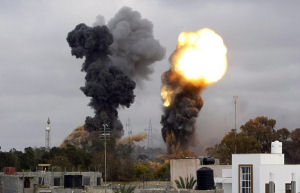How are election preparations unfolding in the Democratic Republic of the Congo (DRC)? Hope or failure? Two perspectives.
Elections and the elusive quest for peace and stability in the eastern DRC: A perspective from the ground, based on fieldwork carried-out in North Kivu province in August and September, 2011 By Lindsay Scorgie Driving down the dusty main road of Butembo – a city of over half a million people, in the eastern DRC province of North Kivu – I hear the usual urban Congolese noises of motorcycles and lorries driving madly by. But these days there is a new sound too: shovels hitting the ground. All along the main road, construction is underway, as the central thoroughfare of Butembo is being paved for the first time. Not only is this an extremely rare sight in Congo, but it …

Europe’s political crisis at heart of eurozone meltdown
The first week of November 2011 has been a tipping point; the moment when it belatedly dawned on pundits and politicians alike that the euro crisis at heart is political – and that if it’s politics versus the markets, then politics is losing hands down for now. From outgoing Greek Prime Minister Papandreou’s torpedoing of the G20 by his ‘bolt from the blue’ referendum call, swiftly withdrawn under outraged pressure from the Merkel-Sarkozy tandem, to Italy’s Berlusconi teetering on the edge, then announcing he will resign and abandon his attempts to cling to power, to Sarkozy himself introducing larger than expected ‘austerity’ cuts despite the upcoming presidential election in 2012 – politics is back. But normal EU politics this is …

The Myth of ‘Sixty Years of Oppression’
Reem Abou-El-Fadl has recently published an article in Al-Akhbar English newspaper entitled ‘From Nasser to Tantawi: The Myth of “Sixty Years of Oppression”‘. The article considers the connections that have been made in Egypt between the July 1952 Revolution, launched by the Free Officers movement, and the January 2011 Revolution, launched by this year’s popular uprising in Egypt. The article acknowledges that military officials first came into government after the July Revolution, but it goes on to explore the deceptive myth of ‘sixty years of oppression’ since, which has been heard often in recent months. ‘Yet today’s generals are protecting an entirely different set of interests from those important to the Free Officers. They have presided over months of delay …
No News is Good News in Poland
Poland used to be known for its dramatic events, and fury of news. This is no longer the case. While most of Europe is boiling, Poland is now an oasis of stability, almost boredom. Its economy keeps growing, but not spectacularly. Its handling of the EU presidency is smooth, but deals with marginal matters. And in this week’s parliamentary elections, after a very dull electoral campaign, Poles again voted in the same two-party coalition. This is surreal by Polish standards. For in the first 18 years since the end of communism, Poland had 13 different governments, a new one every 17 months on average. But now it looks as though Donald Tusk, the leader of the center-right Civic Platform party, …
Gender Matters in Selection of Female Party Candidates in Canada
Christine Cheng has recently co-published an article with Margit Tavits in Political Research Quarterly arguing that female party presidents in Canada are more likely to nominate female party candidates. The research is based on original data from Canada’s 2004 and 2006 federal elections. When the party’s gatekeeper or president is female, the candidate is also six percent more likely to be a woman. The effect is small, but statistically significant, making it important to consider in policies aimed at increasing female representation in politics. Namely, beyond parties’ formal rules to encourage female participation, informal interactions matter. Having more women in top political posts can be just as effective for attracting women to politics as formal party regulations. Another important finding …

Which Entity is the Government of Libya and Why does it Matter?
In the past couple of days, Germany and Canada have joined the group of countries that have declared that they consider the National Transitional Council (NTC) in to be the “legitimate representative” of the Libyan people. But what exactly does this mean? According to the BBC, the group of countries extending this recognition includes France, the UK, Italy, Spain, Germany, the UAE, Qatar, Jordan, Gambia, Senegal and Australia. Russia and the United States have had meetings with the NTC and have also made similar declarations about the illegitimacy of the Gaddafi regime and about the legitimacy of the NTC (see previous post by Stefan Talmon on the US position in March). What are the legal implications, if any, of these …
Remembering the Orange Revolution
Before the varied attire of Arab Spring protesters, in recent times, revolutions tended to come in colours. Ukraine was awash with orange. Kyrgyzstan chose pink and Georgia rose. Thailand could not make its mind up over red and yellow. Choices varied but in each instance pigmentation signified unity behind certain causes and grievances. Yet in some cases the colours imbued more than solidarity – they bred an artistic renaissance. Last Friday, Olga Onuch, a former DPhil student in the DPIR and now a post-doc at the University of Toronto, and her father, Jerzy Onuch, spoke about the intersection between art and protest. Both know a lot about the topic: it is the subject of Ms. Onuch’s recently completed PhD dissertation …
Mundane internet tools and political mobilization
For some time, I’ve been developing the argument that when we want to understand the role of internet technologies in politics—in particular when it comes to getting people involved in electoral campaigns, in various forms of activism, and in other forms of civic and political activity—we should focus less on the newest and most heavily hyped tool of the moment (Twitter election! Twitter revolution!) and pay more attention to the role of what I call “mundane internet tools” like email, search, and ordinary websites. New Media & Society has published the article where I make the argument, based on ethnographic research I did during the 2008 U.S. elections, but based on intuitions and interests aroused by previous research in the …









